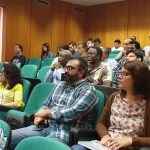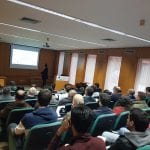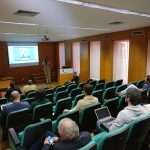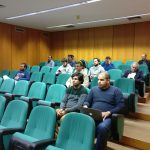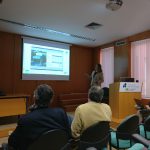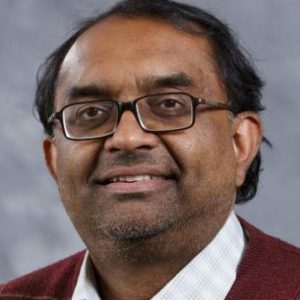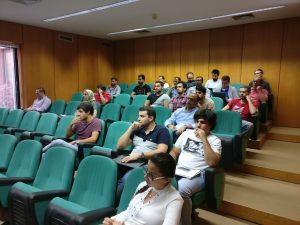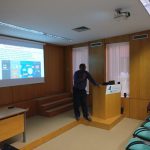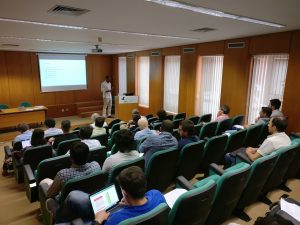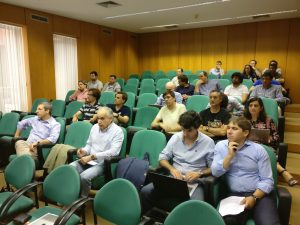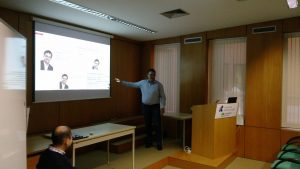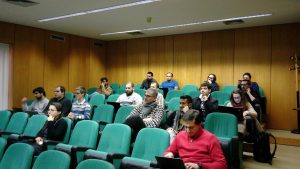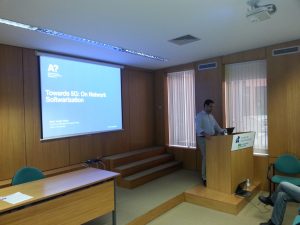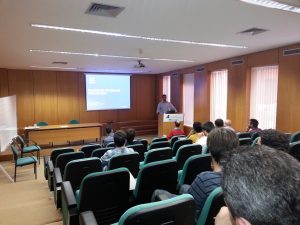The ComSoc Portuguese Chapter is involved in several ways in conferences, talks, lectures or other events that join the portuguese scientific community working in the vast area of Communications.
27-28 November, 2019
ISCTE – University Institute of Lisbon, Lisbon (Portugal)
2nd Visions for Future Communications Summit
Technologies and Services Towards 6G
Organized by Networld2020 with the support of 5G Infrastructure Association, European Commission and IEEE

Vision of Future Communications Summit is a top-quality research workshop, with the support of IEEE, oriented to identify key research areas in informatin and communication technologies in the mid-future of 7 to 10 years. It will follow from the previous event held in 2017, considering that now 5G is upon us.Over 70 attendants participated in this event, which featured 4 keynotes, and 27 presentations.https://futurecomresearch.eu/
27th June, 2019
Instituto de Telecomunicações, Aveiro, Universidade de Aveiro
Prof. Dr. Octavia Dobre, Professor and Research Chair at Memorial University, Canada
Date and time: Thursday, June 27, 10:30Location: Amphitheater, IT1, AveiroAbstract: With the 3GPP Release 15 on the standalone 5G New Radio out in 2018 and with Release 16 coming out this year, 5G is already a reality. While continuing to address the ever increasing demand for high data rates, ubiquitous connectivity and mobility provisioning, 5G and beyond wireless also aims to accommodate a massive number of devices with various traffic characteristics. Massive connectivity and ultra-reliable low-latency communications represent new features, which bring up major changes in the wireless ecosystem. To satisfy the wide requirements in terms of capacity per area, peak and user experienced data rate, spectral and energy efficiency, mobility, connection density, reliability, latency and security, innovative technologies have been explored by both industry and academia in recent years.This talk will provide an overview of 5G networks, emphasizing on the use cases for the three pillars, the standardization timeline, and enabling technologies. Advantages and challenges of adopting different technologies, such as full duplex and non-orthogonal multiple access, will be underlined. Machine-type communications will be discussed as an important driving force of future wireless networks, which allows the expansion of the wireless ecosystem to other industries like energy, healthcare, transportation, and agriculture. Finally, in an attempt to answer the question “Quo vadimus,” research directions are highlighted for the dynamic and exciting field of future wireless communications.Bio: Octavia A. Dobre is a Professor and Research Chair at Memorial University, Canada. Previously, she was with the Polytechnic Institute of Bucharest and New Jersey Institute of Technology, USA. She was a Visiting Professor with Massachusetts Institute of Technology, USA and Université de Bretagne Occidentale, France, as well as a Chair of Excellence at Universidad Carlos III of Madrid, Spain. Dr. Dobre was a Royal Society Scholar and a Fulbright Scholar. Her research interests include enabling technologies for 5G and beyond, blind signal identification and parameter estimation techniques, cognitive radio systems, resource allocation, as well as optical and underwater communications.Dr. Dobre serves as the Editor-in-Chief of the IEEE Communications Letters, and was an Editor of numerous prestigious journals. She has served as General Chair, Tutorial Co-Chair, and Technical Co-Chair at various conferences. She is a member-at-large of the Board of Governors of the IEEE Communications Society, and a Fellow of the Engineering Institute of Canada.
1st March, 2019
Instituto de Telecomunicações, Aveiro, Universidade de Aveiro
Dr. Ashutosh Dutta, Director, Industry Outreach-IEEE Communications Society, IEEE 5G Initiative Founding Co-Chair and Senior Scientist JHU/APL (Johns Hopkins University/Applied Physics Lab)
Title: Security in SDN/NFV and 5G Networks-Opportunities and Challenges
Abstract: Software Defined Networking (SDN) and Network Function Virtualization (NFV) are the key pillars of future networks, including 5G and Beyond that promise to support emerging applications such as enhanced mobile broadband, ultra low latency, massive sensing type applications while providing the resiliency in the network. Service providers and other verticals (e.g., Connected Cars, IOT, eHealth) can leverage SDN/NFV to provide flexible and cost-effective service without compromising the end user quality of service (QoS). While NFV and SDN open up the door for flexible networks and rapid service creation, these offer both security opportunities while also introducing additional challenges and complexities, in some cases. With the rapid proliferation of 4G and 5G networks, operators have now started the trial deployment of network function virtualization, especially with the introduction of various virtualized network elements in the access and core networks. These include elements such as virtualized Evolved Packet Core (vEPC), virtualized IP Multimedia Services (vIMS), Virtualized Residential Gateway, and Virtualized Next Generation Firewalls. However, very little attention has been given to the security aspects of virtualization. While several standardization bodies (e.g., ETSI, 3GPP, NGMN, ATIS, TIA) have started looking into the many security issues introduced by SDN/NFV, additional work is needed with larger security community involvement including vendors, operators, universities, and regulators. This tutorial will address evolution of cellular technologies towards 5G but will largely focus on various security challenges and opportunities introduced by SDN/NFV and 5G networks such as Hypervisor, Virtual Network Functions (VNFs), SDN Controller, Orchestrator, Network slicing, Cloud RAN, and security function virtualization. This tutorial will also highlight some of the ongoing activities within various standards communities and will illustrate a few deployment use case scenarios for security including threat taxonomy for both operator and enterprise networks. In addition, I will also describe some of the ongoing activities within IEEE Future Network initiative including roadmap efforts and various ways one can get involved and contribute to this initiative.
Bio:
Ashutosh Dutta is currently Senior Wireless Communication Systems Research Scientist and JHU/APL Sabbatical Fellow at Johns Hopkins University Applied Physics Labs (JHU/APL), USA. Most recently he served as Principal Member of Technical Staff at AT&T Labs in Middletown, New Jersey. His career, spanning more than 30 years, includes Director of Technology Security and Lead Member of Technical Staff at AT&T, CTO of Wireless at a Cybersecurity company NIKSUN, Inc., Senior Scientist in Telcordia Research, Director of Central Research Facility at Columbia University, adjunct faculty at NJIT, and Computer Engineer with TATA Motors. He has more than 90 conference and journal publications, three book chapters, and 30 issued patents. Ashutosh is co-author of the book, titled, “Mobility Protocols and Handover Optimization: Design, Evaluation and Application” published by IEEE and John & Wiley that has recently been translated into Chinese Language. Ashutosh served as the chair for IEEE Princeton / Central Jersey Section, Industry Relation Chair for Region 1 and MGA, Pre-University Coordinator for IEEE MGA and vice chair of Education Society Chapter of PCJS. He co-founded the IEEE STEM conference (ISEC) and helped to implement EPICS (Engineering Projects in Community Service) projects in several high schools. Ashutosh currently serves as the Director of Industry Outreach for IEEE Communications Society and is the founding co-chair for IEEE 5G initiative. He also serves as IEEE Communications Society’s Distinguished Lecturer for 2017-2018. Ashutosh serves as the general co-chair for the premier IEEE 5G World Forum. He was recipient of the prestigious 2009 IEEE MGA Leadership award and 2010 IEEE-USA professional leadership award. Ashutosh obtained his BS in Electrical Engineering from NIT Rourkela, India, MS in Computer Science from NJIT, and Ph.D. in Electrical Engineering from Columbia University under the supervision of Prof. Henning Schulzrinne. Ashutosh is a senior member of IEEE and ACM.
1st March, 2019
INESCTEC, FEUP Campus, Porto
Dr. Ashutosh Dutta, Director, Industry Outreach-IEEE Communications Society, IEEE 5G Initiative Founding Co-Chair and Senior Scientist JHU/APL (Johns Hopkins University/Applied Physics Lab)
Title: Mobility Handover Optimization Framework and IEEE 5G Initiative
As mobile networks continue to grow and converge with the Internet, new wireless devices and their use are outnumbering the use of fixed network. Mobility management needs to meet the requirements of existing and emerging network technologies and applications. It may be supported in different layers of the network protocol stack. At the IP layer, Mobile IP, an IP-based mobility management, has the advantage of being applicable in any IP-based network, but is faced with many deployment challenges. Numerous variants of Mobile IP have been proposed to address these challenges in different network environments. Research in mobility management has become more active, especially with the mobile networks continuing to evolve from hierarchical towards more flattened network and densification of wireless networks. This talk presents the basics, recent advances, and future directions for mobility protocols at various layers (e.g., network, transport and application). This talk then provides taxonomy of existing mobility protocols, illustrates an abstract mobility model that can be used to support various handoff scenarios. Various handoff optimization methodologies will be explained supported by experimental and simulation results. This talk cites a few deployment scenarios to describe applicability of mobility protocols to various network environments. Finally, the talk goes through the best practices for mobility management and provides some research directions.
During the latter part of the talk I will give an overview IEEE 5G and Beyond Initiative, various ongoing activities of several roadmap working groups and entail procedures to get involved in this initiative.
Bio:
Ashutosh Dutta is currently Senior Wireless Communication Systems Research Scientist and JHU/APL Sabbatical Fellow at Johns Hopkins University Applied Physics Labs (JHU/APL), USA. Most recently he served as Principal Member of Technical Staff at AT&T Labs in Middletown, New Jersey. His career, spanning more than 30 years, includes Director of Technology Security and Lead Member of Technical Staff at AT&T, CTO of Wireless at a Cybersecurity company NIKSUN, Inc., Senior Scientist in Telcordia Research, Director of Central Research Facility at Columbia University, adjunct faculty at NJIT, and Computer Engineer with TATA Motors. He has more than 90 conference and journal publications, three book chapters, and 30 issued patents. Ashutosh is co-author of the book, titled, “Mobility Protocols and Handover Optimization: Design, Evaluation and Application” published by IEEE and John & Wiley that has recently been translated into Chinese Language. Ashutosh served as the chair for IEEE Princeton / Central Jersey Section, Industry Relation Chair for Region 1 and MGA, Pre-University Coordinator for IEEE MGA and vice chair of Education Society Chapter of PCJS. He co-founded the IEEE STEM conference (ISEC) and helped to implement EPICS (Engineering Projects in Community Service) projects in several high schools. Ashutosh currently serves as the Director of Industry Outreach for IEEE Communications Society and is the founding co-chair for IEEE 5G initiative. He also serves as IEEE Communications Society’s Distinguished Lecturer for 2017-2018. Ashutosh serves as the general co-chair for the premier IEEE 5G World Forum. He was recipient of the prestigious 2009 IEEE MGA Leadership award and 2010 IEEE-USA professional leadership award. Ashutosh obtained his BS in Electrical Engineering from NIT Rourkela, India, MS in Computer Science from NJIT, and Ph.D. in Electrical Engineering from Columbia University under the supervision of Prof. Henning Schulzrinne. Ashutosh is a senior member of IEEE and ACM.
4th September, 2018
ICL-GNSS 2018 INTERNATIONAL CONFERENCE ON LOCALIZATION AND GNSS 2018
International Conference on Localization and GNSS, Guimaraes, Portugal, June 26-28, 2018
http://www.icl-gnss.org/2018/
25th May, 2018
WORKSHOP “5G: FROM DEPLOYMENT TO EXPLOITATION”
Workshop on the Portuguese 5G Mobilizer project, held at the Parque de Ciência e Inovação, Universidade de Aveiro, Portugal
2nd March, 2018
MAP-TELE SEMINAR
Presentation and talk done to the students of the MAP-Tele Doctoral Programme, at the Universidade do Minho (Campus de Azurém), by Dr. Daniel Corujo, entitled “Beyond 5G”.
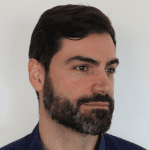 Dr. Daniel Corujo is Research Team Coordinator at the Instituto de Telecomunicações, at the campus of the University of Aveiro, where he also teaches. He has a broad experience in telecommunications and networking related research, standardisation and dissemination, with 80+ publications over conferences, journals and book chapters. He has been researching on 5G technologies and enablers, in national and international research projects, as well as industry contracts.
Dr. Daniel Corujo is Research Team Coordinator at the Instituto de Telecomunicações, at the campus of the University of Aveiro, where he also teaches. He has a broad experience in telecommunications and networking related research, standardisation and dissemination, with 80+ publications over conferences, journals and book chapters. He has been researching on 5G technologies and enablers, in national and international research projects, as well as industry contracts.
13th November, 2017
Instituto de Telecomunicações, Aveiro, Universidade de Aveiro
Prof. Regiane Relva Romano presentation on Smart Campus FACENS
“Smart Campus FACENS: da teoria à prática do desenvolvimento de uma cidade mais humana, sustentável e inteligente”, at the Amphitheater of the Instituto de Telecomunicações, Aveiro, Universidade de Aveiro.
sustentável e inteligente”, at the Amphitheater of the Instituto de Telecomunicações, Aveiro, Universidade de Aveiro.
O Smart Campus é um laboratório vivo que busca solucionar problemas reais, conectando a comunidade acadêmica, mercado e sociedade, por meio de projetos que tornam as cidades mais humanas, inteligentes e sustentáveis. Tem como visão apoiar a formação de engenheiros cidadãos e felizes, por meio da solução de problemas reais, com a finalidade de multiplicá-las no contexto urbano.
Regiane Relva Romano é escritora, professora-doutora convidada no MBA da Fundação Getúlio Vargas, Fundação Instituto de Administração (FIA/USP), da Fundação Dom Cabral e da USP ESALQ. Coordenadora Licenciada dos Cursos de Tecnologia em Análise e Desenvolvimento de Sistemas e de Sistemas de Informação – UNIFIEO. CEO da VIP-SYSTEMS Informática & Consultoria. Membro do Comitê Europeu de RFID/Internet Of Things e vencedora do Prêmio ID People Awards. Nos últimos anos, tem se dedicado à participação em feiras e congressos internacionais com foco na busca por tecnologias emergentes aplicadas ao varejo, aos negócios em geral e Internet das Coisas (IoT), tais como NRF, Euroshop, CES, CeBIT e Internet of Things. Aperfeiçoou-se em Varejo Internacional pela Universidade de Ohio (USA), em RFID pela Universidade de Arkansas (USA) e em Negócios na Universidade Columbia (USA), além de 5 pós-graduações, mestrado e doutorado na área de Tecnologia da Informação. Palestrante internacional. Coordenadora Geral do Smart Campus FACENS, programa que recebeu o Prêmio Top Educacional 2016 e o Prêmio Inovação da GS1 na Categoria Educação, também em 2016 e o Prêmio Smart City UK – London 2017. Consultora de inovação e tecnologia aplicadas aos negócios, com mais de 30 anos de experiência em TIC.
(27/9/2017) Prof. Sumit Roy Distinguished Lecture
This talk presented an overview of current research that thematically centers around Spectrum Sharing – a topic whose importance has been ratcheted by the Jun 2010 U.S. Presidential Memorandum (https://www.whitehouse.gov/the-press-office/presidential-memorandum-unleashing-wireless-broadband-revolution) to “make available a total of 500 MHz of Federal and nonfederal spectrum over the next 10 years, suitable for both mobile and fixed wireless broadband use”. The first down payment on the above is the current AWS-3 transition (https://www.ntia.doc.gov/category/aws-3-transition) of 50 MHz of spectrum that will require spectral coordination between numerous Federal incumbents (radar, navigation etc.) and cellular operator networks (notably, 4G LTE and WiFi).
Spectrum Mapping using Wide Area RF Software Defined Radio/Sensors
The need for more efficient spectrum use has led to notion of Dynamic Spectrum Access (DSA) whereby secondary (unlicensed) users are permitted to use some bands on a `non-interfering’ basis with the primary (licensed) users (e.g. TV White Spaces). This in turn has resulted in database centric architectural solutions (to ensure the desired protection to the licensed incumbent) with the recognition that wide-area distributed spectrum sensing using fixed (and in future mobile crowdsourced) spectrum sensors could be an integral component of such systems. The talk will describe recent work on developing low-cost distributed spectrum monitoring infrastructure.
Link Layer Enablers for Spectral Co-existence: Radar/Wi-Fi & LTE
Effective spectrum sharing will rely on new ideas and effective tools for modeling and analysis of spectral co-existence between dis-similar systems. UW team has developed a suite of analytical and simulation approaches to explore co-existence between co-located Federal (e.g various types of radars) and civilian communication systems, at both the link and network levels. These include, necessarily balancing two conflicting goals: ensuring that the cumulative impact of civilian communication technologies (such as cellular LTE and WiFi networks) fall within incumbent protection guidelines as required, while simultaneously quantifying the impact of radar interference on such network throughput. This part of the talk will describe some recent results on link layer co-existence mechanisms between a search radar and Wi-Fi networks.
BIO
Sumit Roy received the B. Tech. degree from the Indian Institute of Technology (Kanpur) in 1983, and the M. S. and Ph. D. degrees from the University of California (Santa Barbara), all in Electrical Engineering in 1985 and 1988 respectively, as well as an M. A. in Statistics and Applied Probability in 1988. Presently he is Integrated Systems Professor of Electrical Engineering, Univ. of Washington where his research interests include fundamental analysis/design of wireless communication and sensor network systems spanning a diversity of technologies and system application areas: next-gen wireless LANs and beyond 4G cellular networks, heterogeneous network coexistence, spectrum sharing, white space networking and software defined radio platforms, vehicular and underwater networks, smart grids and RFID sensor networking.
He spent 2001-03 on academic leave at Intel Wireless Technology Lab as a Senior Researcher engaged in systems architecture and standards development for ultra-wideband systems (Wireless PANs) and next generation high-speed wireless LANs. Among other distinctions, he was Science Foundation of Ireland’s E.T.S. Walton Awardee for a sabbatical at University College, Dublin (Jan-July 2008), was the recipient of a Royal Acad. Engineering (UK) Distinguished Visiting Fellowship (summer 2011), served as Visiting Research Scientist at Microsoft Research, Bangalore, India (8 weeks, Aug. 2014-Jan. 2015), an Erskine Fellow at Univ. of Canterbury, Christchurch, New Zealand (6 weeks, Mar.-Apr. 2015) and a High-End Visiting Expert for Shanghai JiaoTung University (2015-present). His activities for the IEEE Communications Society (CommSoc) includes membership of several technical and conference program committees, notably the Technical Committee on Cognitive Networks. He currently serves as CommSoc Distinguished Lecturer and was elevated to IEEE Fellow by Communications Society in 2007 for “contributions to multi-user communications theory and cross-layer design of wireless networking standards”.
(18/7/2017) 23rd RTCM in Aveiro
The 23rd Seminar of the Rede Temática de Comunicações Móveis (RTCM) was held at the Instituto de Telecomunicações, in the Universidade de Aveiro campus, Portugal, with the support of the IEEE ComSoc Portugal Chapter. Several academia and industry keynotes were complemented with presentations on on-going and concluded research work in several research topics of the network and telecommunications areas.
(19/1/2017) IEEE 5G Summit in Lisbon
This past 19th of January, at the Auditório J.J. Laginha in ISCTE-IUL, Lisbon, the IEEE ComSoc Portugal Chapter organized an edition of the IEEE 5G Summit.
This event counted with different panels and presentations, joining industry leaders, regulators and the academic community in addressing the challenges, vision and directions for 5G research.
This was the 12th event of the IEEE 5G Summit in the series, since May 2015, which had 208 on site attendees, and over 500 remote stream visualization
(18/1/2017) 22nd Seminar of the ‘Rede Telemática de Comuicações Móveis’
The IEEE ComSoc Portugal Chapter supported the realization of the 22nd seminar of the ‘Rede Telemática de Comuicações Móveis’. The event was held at the 18th January in the Auditório J.J Laginha in ISCTE-IUL, Lisbon.
The event allowed for several different presentations from the most prestigious research groups in Portugal on the area of mobile communications.

(5/1/2017) Distinguished speech by Prof. Dr.-Ing. Stefan Wesner
Distinguished Speech by Prof. Dr.-Ing. Stefan Wesner
Organization – IEEE ComSoC Portugal Chapter –http://portugal.chapters.comsoc.org/
5th January, 2016, 16h30 -Instituto de Telecomunicações, Universidade de Aveiro
We are pleased to announce the presence of the distinguished lecturer, Prof. Dr.-Ing. Stefan Wesner, who visited us at the Instituto de Telecomunicações, in the Universidade de Aveiro Campus. The title of the presentation was:
“BelWü – A High Speed Network Supporting a State Wide Secure Cloud Infrastructure”
The region of Baden-Württemberg operates its own dark fibre based research network currently connecting 9 universities, more than 40 universities of applied sciences and other non-profit organisations such as cultural institutions or schools between each other and to the Internet. BelWü has just completed a major upgrade of its optical infrastructure from a static optical network towards a dynamic and flexible ROADM based solution and will upgrade its IP layer accordingly connecting the universities with redundant 100Gbps.
The network evolution is driven by a regional service provision concept across the universities supporting cross-organisational services such as compute clouds, long term archiving, high performance computing services but also common IT services such as the library management system.
Technology choices and challenges with a 100Gbps connectivity have been investigated within the bwNET100G+ and bwCloud Projects bringing together the network operation centre of BelWü, the computing centres of the nine universities and researchers in the region specialised in relevant fields such as high speed transport protocols, security solutions at high speeds, software defined networking and Cloud computing.
This talk will outline the technological evolution of BelWü in 2017 and how the regional service provision (using bwCloud as an example) and technology evaluation projects such as bwNET100G+ supported technological choices.
BIOGRAPHY
Prof. Dr.-Ing. Stefan Wesner is the director of the Communication and Information Centre (KIZ) and the institute for Organisation and Management of Information systems (OMI) of the University of Ulm. Furthermore, he is the scientific chairman of the research network ISP connecting the 9 state universities and 40 applied research schools in the region. He has been actively participating in research projects on national and international level since 1997, focusing in particular on distributed systems and improving programmability and usability of large scale systems.
His research interests are currently focused on intelligent and adaptive execution environments for next generation of Cloud infrastructure systems. This covers in particular Multi-Cloud solutions and integration of Cloud and Software Defined Networking in wide area networks. Furthermore his group is working on efficient programming of heterogeneous computing systems.
(08/09/2016) Session on “Comunicações e Redes de Computadores (CRC)” at the INFORUM 2016 “Simpósio de Informática”
The IEEE ComSoc Portugal Chapter supported the realization of the “Comunicações e Redes de Computadores (CRC)” – Communications and Computer Networks – at the INFORUM 2016 “Simpósio de Informática” – Informatic Simposium. This session, co-located with the “Gestão de Dados e Conhecimentos (GDC)” – Data and Knowledgement Management, where held on the 8th of September at the Instituto Superior Técnico, and chaired by IEEE ComSoc Portugal Chapter own’s Secretary, Dr. Daniel Corujo.
Distinguished Speech by Dr. Tarik Taleb (06-06-2016)
This past 6th of July, the Instituto de Telecomunicações, at the Universidade de Aveiro in Portugal, had the pleasure of hosting a Distinguished Speech by Dr. Tarik Taleb from Aalto University, Finland, with the title “Towards 5G: On Network Softwarisation”. The talk was very interesting and addressed key concepts of the upcoming 5G network architecture.
More on the talk: “Towards 5G: On Network Softwarisation”
The telecom industry keeps reinventing itself. Soon, the world will be experiencing the 5th generation mobile networks (5G), also referred to as beyond 2020 mobile communication systems. Major obstacles to overcome in 5G systems are principally the highly centralized architecture of mobile networks along with the static provisioning and configuration of network nodes built on dedicated hardware components. This has resulted in lack of elasticity and flexibility in deployment of mobile networks; rendering their run-time management costly, cumbersome and time-consuming. Software Defined Networking, Network Function Virtualization, and Cloud Computing, along with the principles of the latter in terms of service elasticity, on-demand features, and pay-per-use, could be important enablers for various mobile network enhancements, to specifically virtualize and decentralize mobile networks using general-purpose COTS (commercial of the shelf) hardware. For this purpose, different requirements have to be met and numerous associated challenges have to be subsequently tackled. This talk will touch upon the recent trends the mobile telecommunications market is experiencing and discuss the challenges these trends are representing to mobile network operators. To cope with these trends, the talk will then showcase the feasibility of on-demand creation of cloud-based elastic mobile networks, along with their lifecycle management. The talk will introduce a set of technologies and key architectural elements to realize such vision, turning end-to-end mobile networking into software engineering.
More on the author: Prof. Tarik Taleb is an IEEE Communications Society (ComSoc) Distinguished Lecturer and a senior member of IEEE. He is currently a Professor at the School of Electrical Engineering, Aalto University, Finland. He is the EU project coordinator of the EU/JP 5G!Pagoda project, aiming to create an optimal network slice for every service vertical. Prior to his current academic position, he was working as Senior Researcher and 3GPP Standards Expert at NEC Europe Ltd, Heidelberg, Germany. He was then leading the NEC Europe Labs Team working on R&D projects on carrier cloud platforms, an important vision of 5G systems. Before joining NEC and till Mar. 2009, he worked as assistant professor at the Graduate School of Information Sciences, Tohoku University, Japan, in a lab fully funded by KDDI. From Oct. 2005 till Mar. 2006, he worked as research fellow at the Intelligent Cosmos Research Institute, Sendai, Japan. He received his B. E degree in Information Engineering with distinction, M.Sc. and Ph.D. degrees in Information Sciences from GSIS, Tohoku Univ., in 2001, 2003, and 2005, respectively.
Prof. Taleb’s research interests lie in the field of architectural enhancements to mobile core networks (particularly 3GPP’s), mobile cloud networking, network function virtualization, software defined networking, mobile multimedia streaming, social media networking, and UAV-based communications. Prof. Taleb has been also directly engaged in the development and standardization of the Evolved Packet System as a member of 3GPP’s System Architecture working group. Prof. Taleb is a member of the IEEE Communications Society Standardization Program Development Board. As an attempt to bridge the gap between academia and industry, Prof. Taleb founded the “IEEE Workshop on Telecommunications Standards: from Research to Standards”, a successful event that got awarded “best workshop award” by IEEE Communication Society (ComSoC). Based on the success of this workshop, Prof. Taleb has also founded and has been the steering committee chair of the IEEE Conf. on Standards for Communications and Networking.
Prof. Taleb is the general chair of the 2019 edition of the IEEE Wireless Communications and Networking Conference (WCNC’19) to be held in Marrakech, Morocco. He is/was on the editorial board of the IEEE Transactions on Wireless Communications, IEEE Wireless Communications Magazine, IEEE Transactions on Vehicular Technology, IEEE Communications Surveys & Tutorials, and a number of Wiley journals. He is serving as chair of the Wireless Communications Technical Committee, the largest in IEEE ComSoC. He also served as Vice Chair of the Satellite and Space Communications Technical Committee of IEEE ComSoc (2006 – 2010). He has been on the technical program committee of different IEEE conferences, including Globecom, ICC, and WCNC, and chaired some of their symposia.
Prof. Taleb is the recipient of the 2009 IEEE ComSoc Asia-Pacific Best Young Researcher award (Jun. 2009), the 2008 TELECOM System Technology Award from the Telecommunications Advancement Foundation (Mar. 2008), the 2007 Funai Foundation Science Promotion Award (Apr. 2007), the 2006 IEEE Computer Society Japan Chapter Young Author Award (Dec. 2006), the Niwa Yasujirou Memorial Award (Feb. 2005), and the Young Researcher’s Encouragement Award from the Japan chapter of the IEEE Vehicular Technology Society (VTS) (Oct. 2003). Some of Prof. Taleb’s research work have been also awarded best paper awards at prestigious conferences.



